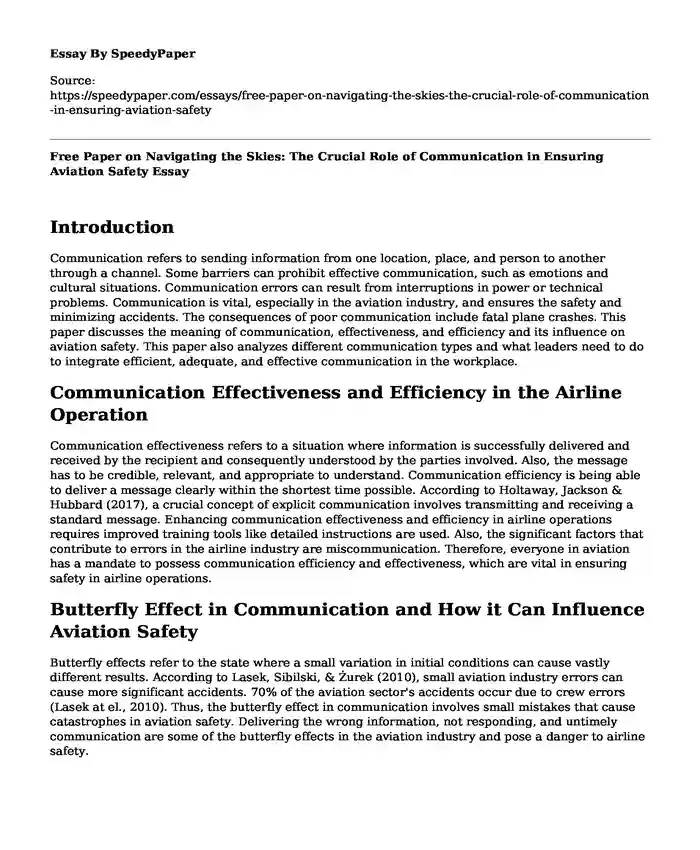
| Type of paper: | Essay |
| Categories: | Communication Aviation |
| Pages: | 3 |
| Wordcount: | 651 words |
Introduction
Communication refers to sending information from one location, place, and person to another through a channel. Some barriers can prohibit effective communication, such as emotions and cultural situations. Communication errors can result from interruptions in power or technical problems. Communication is vital, especially in the aviation industry, and ensures the safety and minimizing accidents. The consequences of poor communication include fatal plane crashes. This paper discusses the meaning of communication, effectiveness, and efficiency and its influence on aviation safety. This paper also analyzes different communication types and what leaders need to do to integrate efficient, adequate, and effective communication in the workplace.
Communication Effectiveness and Efficiency in the Airline Operation
Communication effectiveness refers to a situation where information is successfully delivered and received by the recipient and consequently understood by the parties involved. Also, the message has to be credible, relevant, and appropriate to understand. Communication efficiency is being able to deliver a message clearly within the shortest time possible. According to Holtaway, Jackson & Hubbard (2017), a crucial concept of explicit communication involves transmitting and receiving a standard message. Enhancing communication effectiveness and efficiency in airline operations requires improved training tools like detailed instructions are used. Also, the significant factors that contribute to errors in the airline industry are miscommunication. Therefore, everyone in aviation has a mandate to possess communication efficiency and effectiveness, which are vital in ensuring safety in airline operations.
Butterfly Effect in Communication and How it Can Influence Aviation Safety
Butterfly effects refer to the state where a small variation in initial conditions can cause vastly different results. According to Lasek, Sibilski, & Zurek (2010), small aviation industry errors can cause more significant accidents. 70% of the aviation sector's accidents occur due to crew errors (Lasek at el., 2010). Thus, the butterfly effect in communication involves small mistakes that cause catastrophes in aviation safety. Delivering the wrong information, not responding, and untimely communication are some of the butterfly effects in the aviation industry and pose a danger to airline safety.
Different Types of Communication
Other types of communication include written verbal, visual, and non-verbal communication. In the aviation industry, written communication is the most used and includes emails, newsletters, signage, and reports (Viera, Santos, & Morais 2014). Verbal communication is used by airport attendants, flight dispatchers, and the crew. Non-verbal communications include expressions to convey information, while visuals include photographs, charts, and graphs to obtain information. Communication is crucial between the flight controllers and the passage of information in the crew and the cabin and is used in reading instructions. Different approaches are put to use in different situations in communication
Requirements of Leaders in Integrating Efficient, Adequate, and Effective Communication in the Workplace
Leaders need to communicate relentlessly in the workplace for efficient, adequate, and effective communication. Moreover, leaders need to be direct and straightforward in their contact. Furthermore, it is necessary to have good listening skills and encourage open discussions to enhance efficient communication. According to Foote (2013), leaders need to respond timely when an incomplete message can harm. It is responsible for leaders' responsibility to ensure effective, efficient, and adequate communication in the workplace.
References
Foote, L. M. (2013). Honing crisis communication skills: Using interactive media and student-centered learning to develop agile leaders. Journal of Management Education, 37(1), 79-114. https://journals.sagepub.com/doi/abs/10.1177/1052562912455419
Holtaway, L. E., Jackson, K., & Hubbard, Ph.D., S. M. (2017). Facilitating communication for aviation training and maintenance. In 19th International Symposium on Aviation Psychology (p. 276). https://corescholar.libraries.wright.edu/isap_2017/62/
Lasek, M., Sibilski, K., & Zurek, J. (2010). Aviation Accidents Aetiology From Catastrophe Theory Point Of View. In 27th International Congress of the Aeronautical Sciences, Nice, France. http://www.icas.org/ICAS_ARCHIVE/ICAS2010/PAPERS/707.PDF
Vieira, M.A., Santos, C.I. & Morais, R.P. (2014). POOR COMMUNICATION SKILLS MEANS HIGH RISK FOR AVIATION SAFETY. https://docs.google.com/document/d/13Bmaj8LiUu2srC8qrmc9iddQj3g3yynUZSK1s5sDTqw/edit
Cite this page
Free Paper on Navigating the Skies: The Crucial Role of Communication in Ensuring Aviation Safety. (2023, Dec 22). Retrieved from https://speedypaper.net/essays/free-paper-on-navigating-the-skies-the-crucial-role-of-communication-in-ensuring-aviation-safety
Request Removal
If you are the original author of this essay and no longer wish to have it published on the SpeedyPaper website, please click below to request its removal:
- Free Essay on Ben Franklin, Powerpoint Ppresentation Text
- Presentation Example about Pneumonia, Free Paper for Everyone
- Sports Essay Sample: Legal Duties and Legal Liabilities of Coaches
- Free Essay Example: Types of Business Organization
- Paper Example on Mega Event Planning: Book Review
- Essay Example - The Roles of Planning and Management in A Company
- Report Sample on Cross-Cultural Communication for Law Enforcement
Popular categories




